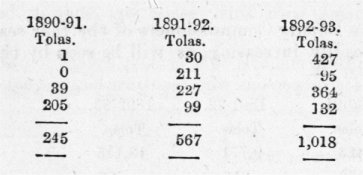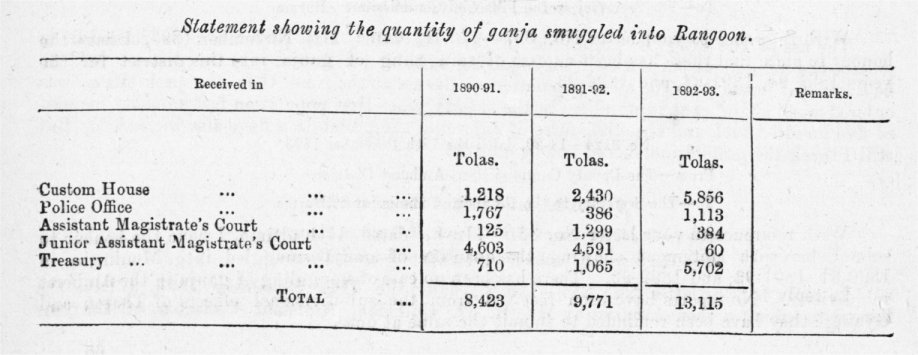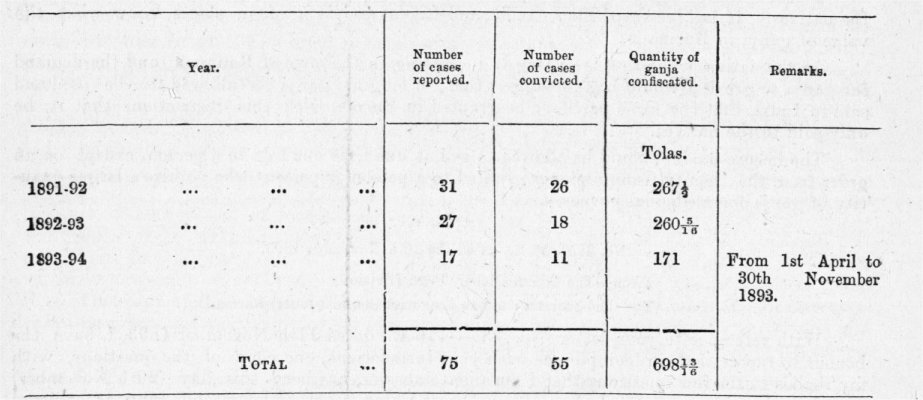| - |
Drug Abuse
LETTER No. 133-11-E., DATED 5Tn MARCH 1894., FROM THE ASSISTANT SECRETARY TO THE FINANCIAL COMMISSIONER, BURMA, TO THE REVENUE SECRETARY TO THE CHIEF COMMISSIONER, BURMA.
l. No. 859-11-E., dated the 27th January 1594.
2. No. 55-11-E., dated the 3rd February 1894.
†1. Letter No. 11-34, dated the ist December 1893, from the Deputy Commissioner, Bassein.
2. Letter No. 3124-14-29, dated the 13th December 1893, from the Deputy Commissioner, Amherst, with enclosures.
3. Letter No.502-14- 1443It, dated the ist December 1893; from the Deputy Commissioner, Akyab.
4. Letter No. 6-62-11., dated the 13th December 1893, from the Deputy Commissioner, Rangoon Town District, with enclosures.
5. Letter No. 315-56-E., dated the 20th November 1893, from Commissioner, Pegu with copy of answer to question 35.
6. Letter No. 494-20;dated the 2nd December 1893, from Chief Collector of Customs. (Copy of enclosures forwarded with Secretary to Financial Commissioner's letter No. 55-11-E., dated 3rd February 1894.)
7. Letter No. 1322-37-93, dated the 19th December 1893, from the Officiating Commissioner, Arakan, with enclosures.
8. Letter No. 9-1397, dated 12th January 1894, from the Deputy Commissioner, Toungoo.
9. Letter No. 232-14-E., dated the 16th January 1894, from the Commissioner, Southern Division.
10. Letter No. 18-1:, dated the 24th January 1894, from the Deputy Commissioner, N ergui.
11. Letter No. 464-136, dated 30th January 1894, from Commissioner, Tenasserim Division.•
With reference to paragraph 3 of your letter No. 16-2-E.-19, dated the 2nd November 1893, and in continuation of this office letters cited in the margin, * I am directed to forward, for the Chief Commissioner's information, copies of the replies† received from the officers who were consulted concerning—
(I) the smuggling of ganja ; and
(II) the success of the system of prohibition which has been adopted in Burma.
On the first point the information supplied by the Deputy Commissioners of the four seaport towns shows that the smuggling of ganja is steadily increasing, as will be seen by the following summary of cases of smuggling detected, viz. :—

The increase is most marked in Rangoon and Akyab, where Indians form a considerable portion of the population. In Moulmein there has been a large falling off. No reason has been given by the Deputy Commissioner for this decline.
2. Colonel Butler, Deputy Commissioner, Henzada, who was also consulted on the two points, is unable to furnish any information, and no report of any kind has been furnished by Lieutenant-Colonel Adamson, Commissioner, Central Division, although, as previously stated an urgent reminder was sent to him on the 20th January 1891.
No. 11--34, dated the ist December 1893.
From—The Deputy Commissioner, Bassein,
To—The Secretary to the Finanuial Commissioner, Burma.
With reference to your letter No. 337-116-E., dated 11th November 1893, I have the honour to state that there has been no ease of smuggling of ganja into this district for the years 1890-91, 1891-92, and 1892-93.
No. 3124-14-29, dated the 13th December 1893.
From—The Deputy Commissioner, Amherst District,
To—The Secretary to the Financial Commissioner, Burma.
With reference to your letter No. 337-116-E., dated 11th ultimo, I have the honour to submit herewith statement showing the quantity of ganja smuggled into Moulmein in 1890-91, 1891-92, and 1892-93. There has been no case of smuggling of ganja in the Amherst sub-division. No reports have been received from the sub-divisional officers of Thaton and Gyaing : they have been reminded to submit the same at once.

No. 502-4R 14-93, dated the 1st December 1893.
From—The Deputy Commissioner, Akyab,
To—The Secretary to the Financial Commissioner, Burma.
I have the honour to acknowledge the receipt of your letter (Financial Department), No. 335-116-E., dated the 11th November 1893. giving cover to two printed copies of" Instructions to witnesses (Burma only)" framed by the Indian Hemp Drugs Commission, and to forward my answers to some of the nine queries framed by the Commission.
2. As regards point (1) I am inclined to think that after a three years' experience as Deputy Commissioner of Rangoon Town from May 1890 to Jule 1893 smuggling has increased, and that it is due to the influx of natives of India from the Madras Presidency, also to the increase of native troops since the events of 1885. The records of cases tried and the experience of the Rangoon excise and cutsoms officers will, I think, prove that I am in all probability right. It is now brought in to some extent by post, but principally in Rangoon by the crew of the British India Steam Navigation Company's steamers, who put it in floating tins, and as they come up the.river, somewhere about Elephant Point, throw it overboard to accomplices who are on the look-out in small boats or sampans
3. As regards point (2), I should think, considering the fact that ganja is not used by indigenous races of Burma, or, if it is, only in very solitary instances, that the system of prohibition has on the whole been successful. But it is by no means certain whether the success may not be due to the fact that the use of opium has taken its place. I cannot give any other facts to support my view. The marginal statement shows approximately the quantity smuggled during 1890-91, 1891-92 and 1892-93.

4. One copy of the answers to these questions has been sent to the Commissioner direct as desired by you.
No. 6-62-R., dated the 13th December 1893.
From—The Deputy Commissioner, Rangoon Town District,
To—The Secretary.to the Financial Commissioner, Burma.
With reference to your letter, Financial Department, No. 337-116-E., dated 11th instant, I have the honour to submit a statement showing the quantity of ganja smuggled into Rangoon in each of the years 1890-91, 1891-92, and 1892-93, together with a copy of Excise Officer Mr. Lewis' report on the subject. It is quite possible that in some cases some ganja has been shown twice over, and the quantities entered by the Chief Collector of Customs as smuggled are also contained in the amounts shown by the District Superintendent of Police and the Magistrate, but I find this cannot now be accurately ascertained.

Report regarding ganja (Financial Department No. 357-116-E).
Ganja was prohibited in Burma in 1873. At that time I was in Thayetmyo, where there was a ganja-shop. Burmans who smoked ganja then were afraid of being punished for being in possession of it and took to using kunbon, which is prepared from opium, betel, and other leaves -cut fine, dried, and fried with opium ; then they smoke it. Natives—especially those belonging to the Commissariat Department, elephant and cattle drivers and lascars—did not give up the use of ganja, but they smoked it secretly, as ganja grew round about there, especially at Allanmyo. The natives also use ganja for medicinal purposes for their cattle. At that time the native troops in the station for two or three days found it very difficult to get ganja; they soon got their supply cheaper than the license-holder sold it to them, as some men started on illicit traffic. In 1875 1 came to Rangoon ; then I found ganja, although prohibited, was used, and men were pointed out to me as ganja-smokers. They did not smoke in public, and how they got their ganja was very diffie&t to find out. After some time it was discovered that large quantities of ganja were imported through banghy post direct from Madras, addressed to butlers of different gentlemen in cantonment, and to the native regiment. This matter was represented to the Local Government, and at that time large quantities of ganja were seized in post.
Since the annexation of Upper Burma in 1883, large numbers of native troops and . followers and cattle-drivers have come to Burma, and the demand for ganja has increased. I have heard that there is no difficulty in getting oanja in up-country. Rangoon is now becoming thickly populated with natives of India who are in the habit of using eranja. As it is not sold in Burma they get it from elsewhere. In the last two or three years large seizures of ganja have been made by the different departments, which plainly shows that smuggling of ganja is on the increase. There is a great demand for ganja by natives of India in Rangoon at present.
The abolishing of the sale of ganja, in Burma has not, I think, reduced the use of it with the natives. It has increased illicit traffic, and bas let people in other places know what the value of ganja in Burma is.
As the native population is so largely increasing in the town of Rangoon' and the demand for ganja so great, I would beg to suggest that, so "Zing as ganja is allowed to be used and sold in India, that the same privilege be granted in Burma, with this restriction, that it be only sold to the natives.
The license-holder should be allowed to sell at one time one tola to a person, except on an order from the Deputy Commissioner granted to a person or persons who require a larger quantity of ganja for medicinal purposes.
No. 315-56-E., dated the 20th November 1893.
From—The Commissioner, Pegu Division,
To—The Secretary to the Financial Commissioner, Burma.
With reference to your letter No. 335-116-E., dated 11th November 1593, I have the honour to report that, in compliance with your instructions, one copy of the questions, with my replies to the few questions that I am able to answer, has been this day (20th November) posted to the address of the Indian Hemp Drugs Commission, and a second copy is enclosed herewith.
With regard to paragraph 2, I have the honour to say that my views on this point are given in my answer to question 35.
Question 35.
Would it be feasible to prohibit the use of any or all of these drugs ? Would the drug be consumed illicitly ? How could the prohibition be enforced ? Would the prohibition occasion serious discontent among the consumers ? Would such discontent amount to a political danger ? Would the prohibition be followed by recourse to (a) alcoholic stimulants or (b) other drugs ?
Colonel C. B. Cooke's answer.
The use of the drug is prohibited in this province. The prohibition is intended to protect the indigenous population from acquiring a habit which is by some persons held to be a cause of insanity. The alien population of Burma at the time that the prohibition was ordered was insignificant in number : in the twenty years that population has probably increased five hundred-fold, and the difficulties of enforcing the prohibition have also increased. But still I think the prohibition should not be omitted.
No. 494-20, dated the 2nd December 1893.
From—The Officiating Chief Collector of Customs, Rangoon,
To—The Secretary to the Financial Commissioner, Burma.
In reply to your letter No. 336-116-E., dated the 11th November 1893, I have the honour to submit a memorandum by Mr. R. G. Culloden, Assistant Collector of Customs and Superintendent of the Preventive Service, Rangoon, an officer of long experience in the department, on the results, from a customs point of view, on the prohibition of ganja, in this province.
The note appears to me to prove that there is a large demand in Burma for ganja ; the people will try to obtain it, and that the statistics of seizures by custom-house officers indicate that determined efforts are made by smugglers to import ganja.
No. 1322-37-93 (Excise), dated 19th December 1893.
From—The Commissioner, Arrakan Division,
To—The Financial Commissioner, Burma.
I have the honour to submit a copy of my replies to the questions asked by the Hemp Commission.
With reference to paragraph 2 of your No. 335-116-E., dated 11th November, I do not think there is any necessity for altering the system of prohibition in force in Burma: except in the Akyab district, which borders on Chittagong, the drug is not much used.
I append a statement showing the number of ganja cases reported and brought to trial with the total amount of ganja seized, since the special excise establishment sanctioned in your No. 282-23-E., dated 10th February 1891, was introduced.
These figures have been supplied by the Inspector of Excise.
Statement showing the number of yanja cases reported and brought to trial and quantity of ganja seized by the special Excise Department, .Akyab, since April 24th, 1891.

No. 97-139, dated the 12th January 1894.
From—The Deputy Commissioner, Toungoo,
To—The Assistant Secretary to the Financial Commissioner, Burma.
With reference to your No. 318-11-E., dated 11th instant, and annexures, I have the honour to forward one copy of the questions of the Hemp Drugs Commission, together with my answers to some of the same.
2. With reference to the last paragraph of your letter No. 335-116-E., dated 11th November 1893, I have the honour to state that in my opinion the system of prohibiting ganja in Burma has been to a very large extent, though not entirely, successful. I base this opinion on my experience as a Magistrate. I regret that I cannot give the actual number of cases brought before me in which the possession of eranja was involved, but they were not sufficiently numerous to accuse the prohibitory system of failure, though quite enough to prove that a demand for the drug does exist, which has to be met by smuggling.
No. 232-14-E., dated the 16th January 1894.
From—The Commissioner, Southern Division,
To—The Financial Commissioner, Burma.
With reference to paragraph 2 of your letter, Financial Department, No. 335-116-E., dated 11th November 1893, I have the honour to report that, as far as my experience goes, the system of prohibition of ganja has worked well. This is based on my experience in different places. It is very possible, however, that the large influx of natives in the Military Police, etc., within the past few years may cause an increase in the consumption, but I think the existing Excise and Police Departments can cope with it.
No. 18 12, dated the 24th January 1894.
From—The Deputy Commissioner, Mergui,
To—The Secretary to the Financial Commissioner, Burma.
In reply to your reminder No. 145-116-E., dated the 5th January 1893, directing attention to paragraph 2 of letter No. 335-116-E., dated the 11th November 1893, calling for an opinion as to the success of the system of prohibition of ganja which has been adopted in Burma, I have the honour to state that, as far as the general public are concerned, the use of ganja is practically extinct. A few of the natives of India still manage to smuggle it in for their own use, and detection is difficult.
2. Owing to my absence on tour, the reply to your reminder has been somewhat delayed.
No. 464-136, dated 30th January 1894.
From—The Commissioner, Tenasserim Division,
To—The financial Commissioner, Burma.
I have the honour to state in reply to the 2nd paragraph of -your Secretary's letter No. 335-116-E., Financial Department, dated 11th November last, that I have never, as far as my recollection serves MP, come across a single instance of a Burman using or possessing ganja. In every.case with which I have had to deal in my 31 years' experience in this province the offender was a native of India. The effect of the prohibitory system has undoubtedly teen to render it somewhat difficult and dangerous for any One to possess the drug, and this must have very largely tended to keep it out of the hands of Burmans. In my opinion, if this system had not been adopted, the results would have been disastrous. Burmans would very certainly have taken to use ganja, for which they have now no desire, and from their national character those who took to it would have used it to excess, as is the case with opium, which, taken in moderation, does no harm.
2. It is most important to remember that the markedly characteristic feature in the Burman character is want of self-control. A Burman is, as a general rule, unable to deny himself anything obtainable. He won't work if he can get natives of India to work for him ; he no sooner makes money than he spends it on silk clothes or in gambling at boat, cart, and pony races. Naturally happy and good-natured and by religion and training careful of life, he, on comparatively slight provocation, attacks his own friend with any weapon on which he can suddenly lay his hand, and will cause death without a thought and because he cannot control himself sufficiently to think. Long-premeditated crimes of violence are comparatively rare : a dacoity is got up in a day or two and is carried out often enough by men who are ordinarily fairly honest peasants, but perhaps gamblers or opium-smokers, or most rarely, if ever, drunkards in want of money to satisfy what by indulgence has become an uncontrollable craving. If a Burman once takes to gambling, to drinking, or to opium-smoking, he is for this very reason lost, and he, by his want of self-control, turns what is a harmless amusement or pleasure into a vice that utterly ruins him and makes him still more recklessly self-indulgent than he is by nature. It is for this reason that opium-smoking is for Burmans such a monstrous evil. If a Burman took to ganja in a similar way as he would were its consumption and even possession not prohibited, the effects would be terrible.
3. I -regret that the very fact of the prohibition renders it impossible for me to furnish you with any statement of fact, except that I have never known a case of a Burman using ganja









